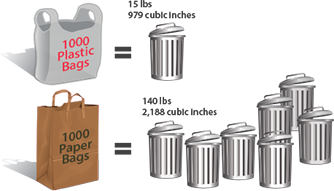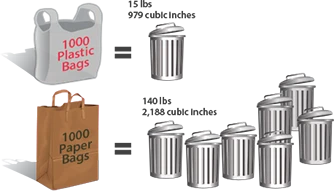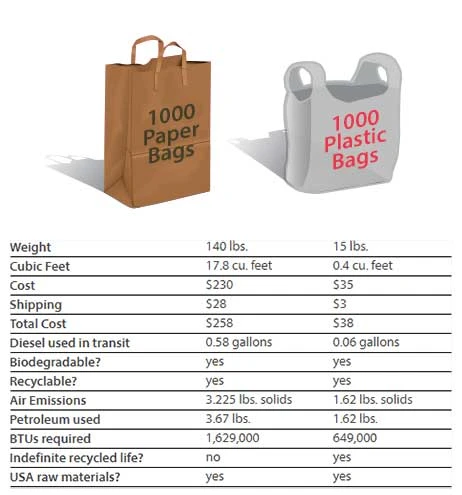Recently Viewed
to select
to navigate
esc to close
Popular Pages
Recently Viewed
Go Back
Custom Packaging
Bags & Liners
Tubing & Film
Packaging Supplies
Shop by Application

Hi there,
how can we help you today?
Shipping options will change based on location.
Current ZIP Code:
Update zip code
User my current location
Order before 4pm EST for same-day shipping on in-stock items!
Lowest Price Guarantee
30-Day Returns & Exchanges
100% Satisfaction Guarantee
Reducing the material is the most significant way to be green. Plastic bags are important and are better than paper products for the various reasons already stated... But the best way to help be green is to look at down gauging. Businesses buy 2 mil bags because that is the industry standard. By understanding the application or use of the bag we can recommend and even test other thicknesses and sizes to help reduce the plastic material needed.
Oil or natural gas that will exist whether converted into plastic or not. If not converted, this waste would be burned off, releasing greenhouse gasses into the atmosphere. Plastic bags are stable and benign in sanitary landfills. Plastic carrier bags can be reused as trash bags or bin bags. Plastic bags are complimentary in many locations but are charged or "taxed" in others.


Reducing the material is the most significant way to be green. Plastic bags are important and are better than paper products for the various reasons already stated... But the best way to help be green is to look at down gauging. Businesses buy 2 mil bags because that is the industry standard. By understanding the application or use of the bag we can recommend and even test other thicknesses and sizes to help reduce the plastic material needed.
Oil or natural gas that will exist whether converted into plastic or not. If not converted, this waste would be burned off, releasing greenhouse gasses into the atmosphere. Plastic bags are stable and benign in sanitary landfills. Plastic carrier bags can be reused as trash bags or bin bags. Plastic bags are complimentary in many locations but are charged or "taxed" in others.
Multiple types of recycled plastic bags are available:
Note: Food grade bags must be manufactured with FDA approved materials and can not contain recycled material.
Advantage of Plastic Bags
Many studies comparing plastic versus paper for shopping bags show that plastic bags have less net environmental effect than paper bags, requiring less energy to produce, transport and recycle; however these studies also note that recycling rates for plastic are significantly lower than for paper. Plastic bags can be incinerated in appropriate facilities for waste-to-energy. Plastic bags are stable and benign in sanitary landfills. Plastic carrier bags can be reused as trash bags or bin bags. Plastic bags are complimentary in many locations but are charged or "taxed" in others.
www.wikipedia.org
Paper Bags VS: Plastic Bags - Real Numbers
If all the shoppers using plastic bags last year had used paper bags instead, they would have increased the amount of solid waste by over 100 million tons and taken up 7 times more space in landfills.
Are plastic bags getting a bad reputation?
Look in almost any newspaper and more than likely you will find an article about local government that is considering to somehow regulate plastic bags. It is becoming easy to hate the "pitiful" plastic bag.
Paper vs. Plastic:
Articles usually leave out the facts as well as the side-by-side comparison. A truthful look at what is required to produce 1000 plastic bags versus 1000 similar paper bags. If the biased media would present the facts, as discerning people we could make educated and wise decisions.
Plastic bags are now biodegradable
Without overloading you will all the tried and true data there is a new additive that can be put into HDPE plastic bags. It helps the Polyethylene molecules biodegrade. This process takes place aerobically or anaerobically. It can happen with or without the presence of light. Even in landfill conditions, which are normally not conducive to bio-degradation, this action can occur. Paper can disintegrate or biodegrade when air and moisture are present, neither of which are abundant in landfills.
What is the root issue with plastic bags?
Litter is the root problem because plastic bags in our past did not degrade at all or were slow to degrade. Today plastic bags can be biodegradable. We do not have to get rid of a misunderstood and good product. A recent newspaper article in a national newspaper states that litter is down in San Francisco due to the ban on grocery store Poly bags. Is that true or are citizens more sensitive to their actions and acting responsible.
Recycling paper versus plastic bags
Plastic bags do not “down cycle”, meaning plastic bags can produce plastic bags infinitely. On the other hand, paper has a limited recyclable life span. The fibers deteriorate too much after continued re-pulping. At the end of papers recyclable life it can only be used in fillers and lower grade materials. Paper and plastic are easy to recycle these days. Paper costs more and requires more energy to recycle. Plastic bags are ground up, extruded and in minutes are new plastic bags.
Green Plastic bags made from agriculture?
PLA (corn based) plastic bags are not recyclable! It is “Compostable”. There is a vast difference. "Corn" bags would disrupt the recycling of normal PE plastic bags and to begin with they cost as much as paper. PLA is great for many products, just not grocery bags in our opinion.
Are plastic bags made out of oil from overseas?
There is less foreign oil used to make plastic bags than there is to make paper ones, due in part because less energy is required. True, some PE is made from oil derivatives; but take a look at the source of that poly resin. In years past, Asian resin was used to make the plastic bags. Currently the Asian governments no longer controls PE resin. Today's sources come from home and start from Natural Gas and a by-product of the distillation of crude oil (foreign or local) but not the oil itself. Ethane Extraction is advancing in the scientific community with exciting new developments and research. Fewer and fewer new materials, ethane or otherwise are needed to make plastic bags.
Where does this leave us?
Both paper and plastic when made in the USA from recycled US materials by emission reducing processes are not particularly bad, they just have different properties.
Recycle: Returning a product for reprocessing into another type of product that would use the components of the original product in its makeup. This is not remaking the old product in a like new product. Recycling reduces the need for additional raw material for the production of bags.
Recyclable: Product which can be collected from waste and made into another product.
Reduce: Using less of something, or use alternatives with less bulk to reduce the content going into landfills.
Re-use: Use again, at least once. A single re-use of a bag will reduce the number of bags going into a landfill by 50%.
Biodegradable: Materials capable of undergoing biological anaerobic or aerobic decomposition by the action of microorganisms such as bacteria, fungi and algae under conditions naturally occurring in the biosphere.
Compostable: Materials that undergo degradation by biological process during composting to yield CO2, water, inorganic compounds and biomass at a rate consistent with other compostable materials in commercial/industrial composting conditions and leave no visible, distinguishable or toxic residue.
Degradable: Materials that have the capability to break down from a whole into parts or completely break down into natural substances in the normal process of exposure to natural events. Most degradable products are either biodegradable or photodegradable. Degradable bags cannot be recycled.
Post Consumer Recycled (PCR): The product discarded by consumers after use, which is separated, then added to new resin material to produce plastic bags. In order to retain the integrity and strength of the bags during use, no more than 25% PCR is used. A bag containing PCR material and one without is minimal or unnoticeable.
Post Industrial Recycled (PIR): Generally plastic scraps and cuttings from plastic bag extrusion. Recycling eliminates any waste from ending up in a landfill.
Shelf Life: Blank or printed degradable bags have a 12 to 18 month shelf life, under normal storage and temperature conditions. Storage in a closed container away from light can help extend the life of the bags.
Shipping assumes truck freight at $20/cwt for 1,000 miles average. 6 mile per gallon hauling 40,000 lbs in a full truck load. Emission and BTU data from The University of Texas at Austin, Michigan Technological University, and the US Environmental Protection Agency 2001. Bags are compared with new materials. Plastic bags require less energy to collect and recycle than paper bags
Source: Nashville Wraps
Green Bags made with 50% recycled waste (15% Post Consumer) or Biodegradable Additive Available in .00175 white. Custom sizes, styles and colors are available:






